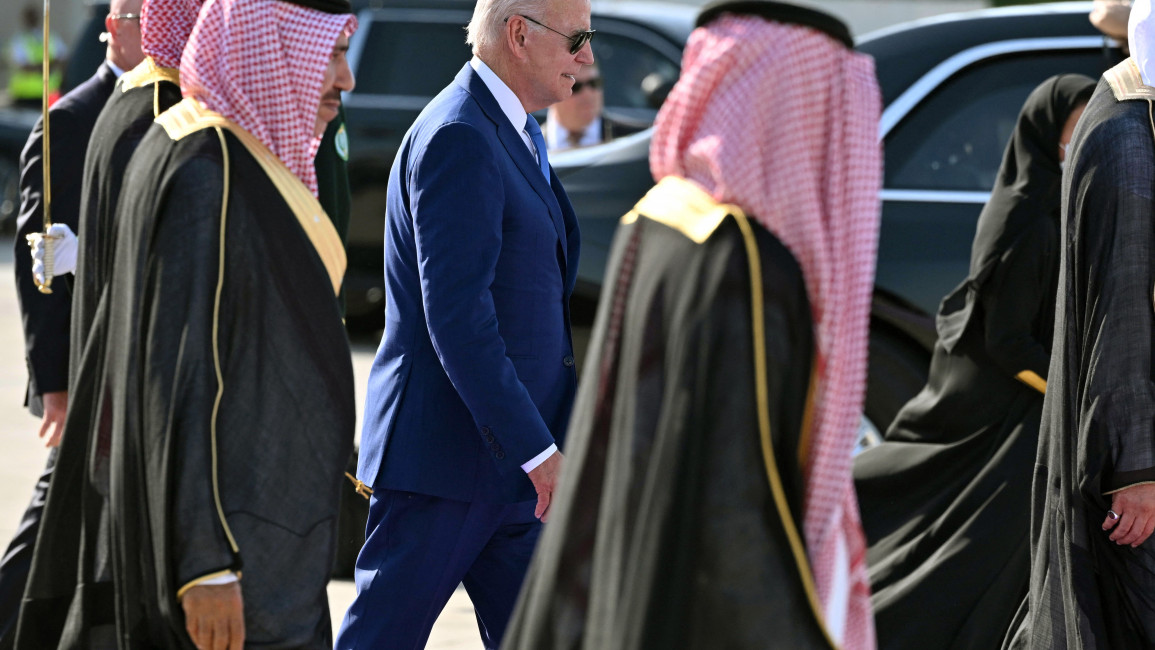
Not going anywhere: The US narrative of withdrawal from the Middle East is a fallacy
Over the past decade, the narrative about US retrenchment from the Middle East has been gaining currency. The official military withdrawals from Iraq and Afghanistan, combined with the decreasing importance of Middle Eastern energy for the US markets, are often brought forward as evidence.
But this narrative carries much oversimplification. America's grand strategy towards the region is not confined to occasional wars and oil trade.
In earnest, the US remains a steadfast player with no intentions of abandoning its leadership status, a position cemented since World War II with the famous meeting in 1945 between President Franklin D. Roosevelt and Saudi King Abdul Aziz Ibn Saud on an American cruiser in the Suez Canal.
In addition to ensuring the free flow of oil in exchange for security, countering terrorism, and preventing nuclear proliferation, the US has always put Israel's supremacy over its neighbours at the top of its regional agenda.
"Continuing to push this narrative of American withdrawal gives Washington a strategic opportunity to probe the behaviour of newcomers like China in the region in light of a perceived sense of American absence"
The 1980 Carter Doctrine laid the groundwork for using military force when necessary, asserting the importance of the Middle East for the US grand strategy.
The Carter Doctrine aimed primarily to prevent the expansion of Soviet influence in the Gulf region. At the time, there were concerns that the Soviet Union could exploit regional instability to gain control over vital oil resources.
And the US did not hesitate to use military force to assert its dominance. The Gulf War of 1990-91, the 2001 invasion of Afghanistan, and the 2003 invasion of Iraq encompass this grim chapter of US interventionism in the region.
These three full-scale military interventions occurred at a particular unipolar moment when the US, as global hegemon, pursued "liberal" interventionism in its foreign policy. During this time, Washington frequently invoked the right to preemptive wars against "rogue" states, particularly in the name of counterterrorism.
"China is not interested in replacing the US's hegemony in the region... the Chinese do not want to take on this kind of commitment"
— The New Arab (@The_NewArab) December 25, 2022
Can China replace US hegemony in the Middle East? 👇 https://t.co/AfL4yzH7Xw
However, today both the bipolar world of the Cold War and the liberal post-war vision referred to by Francis Fukuyama as "the end of history" have faded. With emerging powers like China, the international arena is evolving into a multipolar space.
This situation represents a critical juncture, and Washington must tread carefully.
Continuing to push this narrative of American withdrawal gives Washington a strategic opportunity to probe the behaviour of newcomers like China in the region in light of a perceived sense of American absence.
For now, China seems content to make investments in the region as a free-rider within the US-led security framework, extending the reach of its ambitious Belt and Road Initiative.
Meanwhile, the US seeks insights into the actual military capabilities of Chinese armed forces while probing Beijing's intentions for the region.
While the Chinese leadership is reluctant to step out of its comfort zone, American decision-makers would like to know more about Beijing's true intentions and capabilities, especially if they may face off on the treacherous waters of Middle East politics.
But despite the strategic gains of successfully selling the withdrawal narrative, facts on the ground debunk this myth. The US maintains its dominant position in arms sales, accounting for 54% of global sales and holding a remarkable 78% share in Saudi Arabia's arms imports.
Once countries become clients of the US military-industrial complex, it is extremely hard to turn to other suppliers because of technology, maintenance, and training considerations. Thus, Washington understands that Middle Eastern countries occasionally buying weapon systems from other nations does not constitute a real threat.
Moreover, Washington has developed a tight surveillance mechanism, maintaining a watchful eye over the region’s key players. In April, leaked US intelligence documents revealed how Russia boasted about its cooperation with the UAE, claiming that this would undermine US influence.
"The reality is that US presence in the Middle East has not dwindled; rather, it has simply transformed"
In reality, Russia fell into the withdrawal trap. Emirati officials denied the allegations, while Washington deliberately cloaked the issue in ambiguity. While it is true that American presence has not remained as assertive as it was during the post-9/11 period, this does not mean it has disappeared.
The reality is that US presence in the Middle East has not dwindled; rather, it has simply transformed.
The overall security architecture in the region, which China used at no cost, is changing. The withdrawal narrative offers Washington a rehearsal opportunity in anticipation of a multipolar world.
After all, the US still guarantees Israel's national security, the survival of Gulf monarchies, and the protection of the regional status quo.
However, should the region go out beyond the tolerated confines of the current scenario, providing critical intelligence to Washington's foes, altering their arms supply chains significantly, or threatening the status quo radically, the momentary veil of uncertainty will dissipate, and the US’s conventional tools of influence will resume with renewed vigour.
Burak Elmali is a Researcher at TRT World Research Centre in Istanbul. He holds an MA degree in Political Science and International Relations from Boğaziçi University. His research areas include Turkish foreign policy and great power politics focusing on U.S-China relations and their manifestations in the Gulf. He has contributed many articles to various media outlets.
Follow him on Twitter: @Burak_elmalii
Have questions or comments? Email us at: editorial-english@newarab.com
Opinions expressed in this article remain those of the author and do not necessarily represent those of The New Arab, its editorial board or staff.




